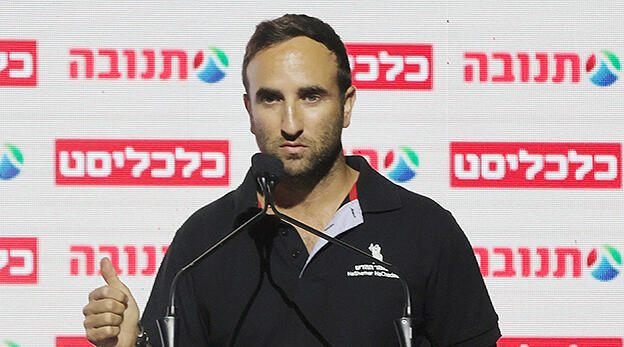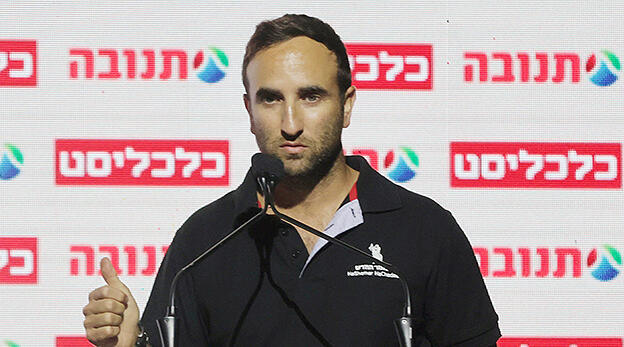
"Food insecurity poses a serious existential threat to Israel that the public doesn't even know about"
Yoel Zilberman, the founder and CEO of HaShomer HaChadash, an agricultural movement, said at Calcalist and Tnuva's food security conference that 100 new agricultural schools need to be opened to counter the shortage of workers and limit Israel’s food dependence on other nations.
"In the United States, agriculture is located in the country’s heartland; in Israel, agriculture is the state’s security," began Yoel Zilberman, founder and CEO of HaShomer HaChadash, or “The New Guardian,” a social Zionist agricultural movement that connects Israeli society to their land and heritage. Speaking at Calcalist and Tnuva's Food Security Conference, he emphasized his view that agriculture and food security are central to the state’s security, Zilberman added that "We could call this conference the Security Conference of the State of Israel.”
Four governments ago, the Minister of Agriculture urgently called Zilberman to say that there was a halt in the country's food supply and a real food security threat. He said that Israel could face hunger and there was a severe shortage of workers, meaning billions of shekels' worth of fruits and vegetables would go unharvested. "The State of Israel faces a real existential threat," the minister told him.
"This was in March 2020, when COVID-19 broke out, and we woke up to the realization that Israel is a tiny country that is unimaginably dependent on others for most of its food. Eighty percent of our caloric intake comes from Ukraine, whose future is uncertain, as well as Turkey and Jordan," Zilberman said. "We saw during the war how the Thai [migrant workers] fled and the enlistment of civil society - without which there would have been a disaster. HaShomer HaChadash mobilized over 25,000 volunteers from all over the country, who left everything and dedicated themselves to saving Israeli agriculture.
"I am sharing this because it highlights the importance of this conference. The Israeli public doesn’t know of this existential threat. They know there is an ammunition shortage, that if a power station or gas platform is hit, we are under existential threat, but they do not understand that an existential threat is hovering over us at this very moment."
When Zilberman founded HaShomer HaChadash, he was a shepherd in Tzipori. "[The organization] was born in the fields. We saw severe issues; that the average age of a farmer had already crossed 60 - today it is 65; a shortage of 600-700 farmers each year; the shrinking of agricultural lands. We realized we are heading towards a process where Israel is giving up on its most beautiful Zionist asset.
"The most important education from the establishment of the state’s infrastructure in 1904 during Gordon, Katznelson, and Ben-Gurion’s time, until the 1980s was the understanding that the land is an inseparable component of this state's existence. When Ben-Gurion wrote the Security Service Act in 1949, he said, 'Defense and protection of the state and agriculture are one.' When Yigal Allon wrote Screen of Sand, he explicitly stated that the army would never come to rescue the citizens, and that they must protect themselves. And if these citizens don’t live on the borders and the area is not populated by people who will practice agriculture, we will be in existential danger."
Zilberman added: "On October 7, the idea of the Iron Wall of the army that would come and defend us collapsed, and the immense importance of returning to Yigal Allon's conception - which had been abandoned - returned. Amid all the strategies, there is great spirit and a tremendous opportunity. Last week, I had the privilege of planting a vineyard for the first time in my life 300 meters from the border with Syria.
"The State of Israel cannot simply survive this war; we need to win it and bring back the hostages and take this opportunity to establish infrastructure like a small group of people who came to settle the Land of Israel. Then, they were small groups - at the time most of the Jewish community was ultra-Orthodox and most Jews were immigrating after the Kishinev Pogrom to the United States. But, those young men and women who did come here were fervently convinced they would establish a state.
"Now, here we are, in a time of plenty yet we're also whining. We need to go out into the sun, get our hands dirty, and know that without returning to the land and our roots, and without educating younger generations, nothing will happen. This generation has been defamed as a screen-addicted, self-obsessed generation, but we now know that they are no less than the Maccabees, the founders of the state, and those who fought during the Six Day War and the Yom Kippur War. This generation is waiting for assignments on the scale of what Yigal Allon imagined, which will ensure the future of the state."
Zilberman outlined three main challenges facing the state: ammunition independence, energy independence, and food independence. "In the last five years, there was a serious embargo on Qatar by Saudi Arabia and the UAE. With a strategic plan, within six months, they went from 15% agriculture to 70% eggs, milk, meat, and vegetables, in 60-degree heat. So it's in our hands. I hope the Minister of Agriculture understands that we need to establish at least 100 agricultural schools to cultivate the next generation of Israeli farmers."















